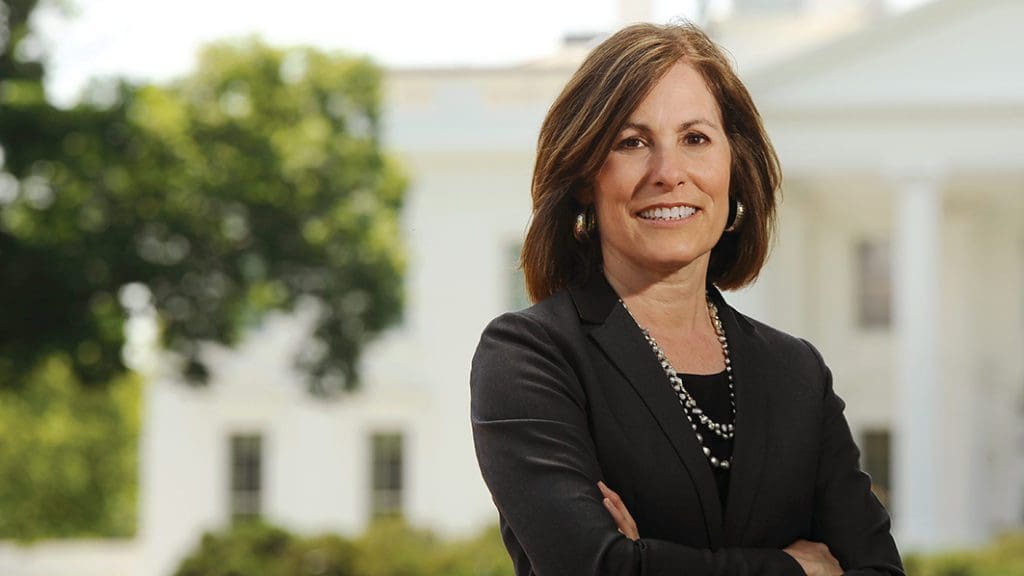Valerie Huber was one of the panellists at the second annual CPAC Hungary, taking place earlier this month at the Bálna Shopping and Cultural Centre in Budapest. Ms Huber took part in a discussion titled ‘Nation’s first’ about the modern threats to national sovereignty. That subject is just one of her areas of expertise, Ms Huber is also the president of The Institute for Women’s Health, serving since 2021. She talked about both of those important topics in an exclusive interview with Hungarian Conservative, and also explained how they are connected in her professional life.
There’s a lot of talk about human rights these days. But they are usually about not individual, but group rights, the rights of minority groups. However, statistically, the right that most people died for is probably national sovereignty. Yet it gets a lot less discussion than these other, gender and minority rights. Why do you think that is and if that maybe should be changed?
I think that in virtually every country in the world, they’re being confronted by radical ideologies that were either brought to the country from other external sources, whether it’s a foundation, another government, or an international organisation, or that are being fomented within the government. But at the core, we have to recognise the importance of the family, as critical to the survival of a nation, and in all of these ideological debates, we have to protect the sovereignty of the country because it’s up to the country and its people to decide rather than be forced upon them by external forces.
International, supernational organisations like the EU or NATO, do you believe they can undermine national sovereignty, or are they something that is a necessary bad that we have to take to be able to conduct effective foreign policy?
So, I think you asked the perfect question. So, if you were to look at the founding documents of the United Nations, it has a very strong sovereignty statement that recognises the equal sovereignty of every member, that means that every nation that is a member of the United Nations. It has strayed far from that. They are usurping and compromising the sovereignty of countries continuously. And although the United States is not in the European Union, and I don’t know all of the specifics, from what I can see, the very same thing is happening in the European Union.
But we did use our sovereignty to join the EU, so how’s that working out? There was a referendum in Hungary in 2004, and once we joined this organisation, there are some rules that we did agree to when we joined. So we did voluntarily give up at least some of our sovereignty.
You are right. With the European Union, there is a relinquishment of national sovereignty on certain issues, mostly regarding economics, and things related to that. However, the European Union strayed far beyond that, and now they are majoring on ideology that was not part of the agreement, and the national position is not being protected overall, and it’s not being respected. So, I would argue, that rather than countries not holding up their end of the agreement, it’s been the opposite, that
the European Union is usurping more that does not belong to them.
Is this somewhat similar to what the United States went through at the time of its foundation? Back then, there were the federalists and the anti-federalists, and the anti-federalists wanted something much more like the European Union today. Do you see any parallels between those debates around the Articles of Confederation, then the Constitution, and what we’re having today here in Europe?
Well, I’m not sure if that’s a real close comparison because it was really a debate over how much influence the federal government should have versus the individual states. But it was still the nation. When you’re talking about a supernational coalition like the European Union, you come into that with certain understandings and expectations, and when they change, after you have already agreed to be in it, then there’s something dishonest about that.
Was it evident from the beginning that the United States was going to be one nation, and not many nations, like Virginia, and all the states being their own nations?
Well, not from the start. But it evolved, not everyone believed that that should be the case, but the overriding opinion led to the United States being a nation.
Valerie Huber on Twitter: “Women’s health is being subjugated to an ideological agenda with little concern for women themselves. In Ecuador, those who would impose their own ideological colonization on Ecuadorian women by insisting upon abortion as a human right have lost. https://t.co/Lig5lbvN9y / Twitter”
Women’s health is being subjugated to an ideological agenda with little concern for women themselves. In Ecuador, those who would impose their own ideological colonization on Ecuadorian women by insisting upon abortion as a human right have lost. https://t.co/Lig5lbvN9y
And how is all this connected to women’s health? How come your expertise ended up being women’s health and national sovereignty? What’s the connection there?
It’s because of the multilateral fora that I saw taking place when I was a special representative, representing the US for women’s health. We were negotiating resolutions with the United Nations, the World Health Organization, and other places. It became very clear very quickly that women’s health was really only about ideology, and it wasn’t about women’s health. And
I saw first-hand nations being coerced and threatened on the floor of the United Nations if they didn’t take the ‘correct’ position.
So, that’s why national sovereignty is really a part of this; we want to make sure that there is a focus on the most pressing needs for women and girls, and ideology is out of it.
What were those ‘correct positions’, were they this new gender theory and transgenderism?
Transgenderism wasn’t that much, but still, LGBTQ and abortion, those were the major ones. They were redefining gender, but there wasn’t so much transgenderism, that was pretty new. It was a part, but not like it is today.
So, abortion was the major issue for them?
Very much so, yeah. And so women’s health was defined by access to abortion, rather than actually curing and addressing those needs.
Is there a disproportionality in funding?
Oh my goodness, tremendously, around the world. If you were to go to a developing country, and you were to see the amount of money that is used for other issues versus, maybe, to ensure that women have access to safe childbirth, it’s absolutely terrible. You see millions of dollars being used for other things, and then you see women dying during birth because there’s no electricity, no running water, no antibiotics, no things like that.
Is this a UN initiative, or are there people in state departments also pushing this?
Oh yes, all of the above. I think the US needs to revisit its foreign policy, and other countries need to revisit their priorities.
But how did this situation come about? I don’t think the general population, the local population of these countries would want this.
No.
So how come it’s being forced on them, who decided that?
Well, if a country wants foreign assistance, they either take what is being offered, or they don’t take it. So there’s no foreign assistance being offered for safe childbirth, then they don’t have the money for it.
But why are we deciding to push so much money towards abortion? Who decided that?
It’s a very good question. It’s whoever providing that foreign assistance.
So, is it the Biden State Department doing it right now?
Well, the US is prohibited from funding abortion abroad, but it’s not prohibited from other things that are aligned with that. But other countries and coalitions of countries, and the United Nations, etc., they don’t have those same prohibitions.
So, just changes of government could fix that, just voting them out would do so?
Yes.
Related articles:








